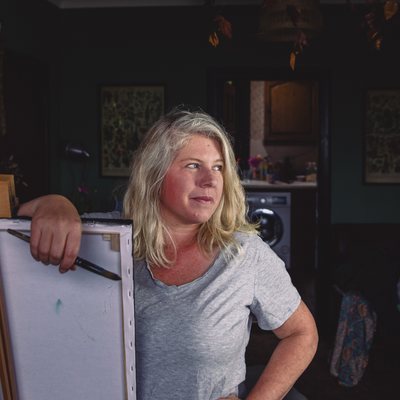I’m an Australian artist and author living in the Scottish Highlands, where wild landscapes and old stories shape my work. Passionate about the natural world, I seek to share beauty and magic through my creations. My mission is to inspire wonder and connection in those who encounter my work.

How To Stop People Pleasing – The Definitive Guide 2025 {updated}
For many of us, the relentless pursuit of being the one who has it all together, striving to keep everyone happy while neglecting our own needs, was once our way of life. But one day, we wake up and realize that we've lost ourselves in this pursuit. This awakening marked the beginning of my journey—a journey filled with research, study, and experimentation on how to break free from the shackles of people-pleasing.
I've been in those trenches, deeply entangled in the web of people-pleasing without even realising it. The compulsion to please seeped into my personal life and even my business, leaving me emotionally drained, stressed, and anxious. I had forgotten who I was, what I was passionate about, and the life direction I truly desired—all because I was too preoccupied with worrying about others.
In this updated article, we'll explore the traits of a people-pleaser, dissect the intricacies of people-pleasing, delve into its causes and effects, and most importantly, learn how to break free from its grip
Understanding People Pleasing
What Defines a People-Pleaser?
A people-pleaser is someone who consistently prioritizes the needs of others over their own. They possess a keen awareness of others' needs but often struggle to advocate for themselves. This self-neglect can breed resentment and harmful assumptions. On the surface, people-pleasers appear helpful, kind, and agreeable, but beneath, they carry unhealed pain stemming from the compulsion to earn approval to sustain relationships.
The Impact of People-Pleasing on Mental Health and Relationships
People-pleasing is a mental health issue that profoundly affects our relationships—with both ourselves and others. It manifests as self-sacrifice, causing emotional and physical exhaustion, stress, and anxiety.
Recognising the Signs
20 Signs You Are a People Pleaser
1. Difficulty Saying No
You often find it challenging to say no, even when you want to decline a request or commitment. For instance, you agree to help a friend move on your only day off because you can't bring yourself to say no.
2. Constant Need for Approval
You frequently seek validation and approval from others to feel worthy and valued. This might mean constantly seeking reassurance from your supervisor that you're doing a good job, even though you're highly competent.
3. Prioritizing Others Over Yourself
You tend to prioritize other people's needs and desires over your own, often at your own expense. For instance, you might cancel your weekend plans to accommodate your partner's preferences, neglecting your own interests.
4. Avoidance of Conflict
You go to great lengths to avoid conflicts or disagreements, even if it means suppressing your own feelings. For example, you don't speak up when a colleague takes credit for your idea during a meeting to avoid confrontation.
5. Excessive Apologizing
You apologise excessively, even for minor things or situations beyond your control. This could mean apologizing profusely when traffic makes you arrive a few minutes late for a meeting, even though it's out of your control.
6. Fear of Disappointing Others
You have a strong fear of letting down or disappointing people, which drives many of your actions. As an example, you agree to attend a family gathering you don't want to go to because you don't want to disappoint your parents.
7. Going Along with the Crowd
You tend to conform to the preferences and opinions of those around you to avoid standing out. For instance, you might pretend to enjoy a movie you don't like because all your friends loved it, and you don't want to be the odd one out.
8. Taking Responsibility for Others' Emotions
You feel responsible for the emotions and well-being of those around you, often to an excessive degree. This can mean taking it upon yourself to cheer up a coworker who had a bad day, even though it's not your responsibility.
9. Struggling with Boundaries
You have difficulty setting and maintaining personal boundaries, often allowing others to overstep them. An example might be letting a friend consistently borrow money without repayment because you can't assert the boundary of financial fairness.
10. Feeling Overwhelmed by Others' Problems
You frequently become overwhelmed by the weight of other people's problems or expectations. This could involve taking on extra work tasks because your colleagues expect you to, even though you're already overloaded.
11. Suppressing Your True Feelings
You avoid sharing your genuine thoughts and feelings to prevent upsetting or offending others. For instance, you pretend to agree with your partner's political views, even though you have a different perspective, to maintain harmony.
12. Prioritizing Others' Happiness
You consistently prioritize the happiness and comfort of others over your own well-being. As an example, you let your friends choose the restaurant for dinner every time, even if you don't enjoy the food.
13. Taking on Extra Responsibilities
You habitually take on extra responsibilities, often going above and beyond, to meet others' expectations. This can mean volunteering to organize a charity event and ending up doing all the work because you want it to be perfect for everyone.
14. Difficulty Making Decisions
You have trouble making decisions, fearing they might displease someone, leading to indecision. An example might be struggling to choose a vacation destination because you're worried it won't satisfy everyone in the family.
15. Feeling Guilty for Self-Care
You feel guilty when you prioritise self-care or say no to others, seeing it as selfish. This could involve skipping your own self-care activities to help a friend, and then feeling guilty for neglecting your own well-being.
16. Desiring Universal Likability
You believe that being liked and accepted by everyone is essential, and you strive for universal approval. This might mean agreeing to attend social events even if they don't interest you, driven by the desire to be liked by everyone.
17. Mirroring Others' Behavior
You frequently mirror the behaviour and interests of those you're with to fit in and gain acceptance. For example, adopting the slang and habits of your new group of friends, even if they don't align with your true personality.
18. Struggling to Identify Your Desires
You have difficulty identifying your own desires, passions, or values separate from others' influences. An example might involve being unable to answer when someone asks about your hobbies because you've adopted your partner's interests as your own.
19. Experiencing Stress and Burnout
You often experience stress, anxiety, or burnout due to the constant pressure of people-pleasing. This could include feeling overwhelmed by commitments and responsibilities, leading to anxiety and exhaustion.
20. Difficulty Asserting Your Needs
You find it challenging to assert your own needs and preferences in relationships and situations. For instance, not speaking up when your friend consistently chooses the restaurant without considering your preferences, leading to unmet needs and frustration.










